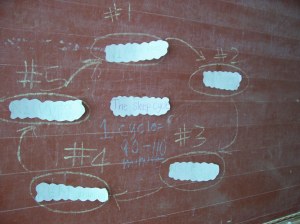Our topic today was dreams and their interpretations. We also talked about the sleep cycle.
First, everyone had to close their eyes (since we generally all dream with our eyes closed) and draw a recent dream that they can remember. Then, they each had to describe their dream. One kid drew a computer, and he said that he plays computer games so often that he has started dreaming about them.
Then, 5 people got slips of paper with a stage of the sleep cycle on it. They had to put the sleep cycle in order. The REM (Rapid Eye Movement) stage is when dreams occur. The average (full) night of sleep includes 4 to 7 dreams (whether we remember them or not.) 20-25% of our sleep cycle is the REM (dreaming) stage. Each sleep cycle (it repeats itself over and over during the night) lasts between 90 and 110 minutes. Some mornings, if you wake up feeling exhausted and not at all ready to get up, it’s probably because your alarm caught you in a deep state of sleep, possibly the 3rd stage or the REM stage. If you’re woken up during the 1st or last stage, then you’re more likely able to get up without feeling nearly dead.
We then discussed meanings of dreams, and if dreams really do have meanings or if they’re mostly completely random. Most of the group agreed that dreams often have some sort of meaning since it’s connected with something in our real life. Dream interpretations are studied by both psychologists and mystics; it is said that they can help people get through difficult times in their life (and realize what their underlying problems are) and it’s also said that dream interpretations are just purely for fun. In my opinion, they’re mostly just fun to read about once in awhile, but who knows? Maybe looking deep into the meanings of dreams really has helped some people, and in that case, that’s great!
Sets of partners got some words (things that might appear in dreams) and some meanings. They had to match up what meanings they thought went with which things/ideas in a dream. Only one set of partners didn’t match them up correctly; everyone else guessed the right ones.
We kept in mind that different cultures have different beliefs as to which dreams mean what; this particular list is from a website written by an American.
Falling = a loss of control
Marriage = death
Death = a life transition
A goldfish = success and wealth
An egg = money
A large bird = friendship
Flying = a sense of freedom
An elephant = you need to learn to be more patient
Wearing a hat = you’re trying to hide something
Wearing a mask = you’re trying to be someone you’re not
A piano = you want harmony in your life
A horse = strength and power
A book = calmness
Fire = anger
Water = many emotions
Afterward, each kid wrote answers to these 3 questions and read them aloud:
1. Why do we dream?
(Answers included things like: We feel nervous/stressed during the day, so our brain cannot stop thinking during the night; It is part of our psychology; Our brains have active imaginations; Because we want to. :))
2. Do you think dreams have meaning?
(Answers included: Yes, because they can sometimes tell us the future; No, because we often dream what we wish was real; Yes, because I play computer games.:))
3. Do you usually remember your dreams?
(Answers included: No, never – I have never remembered a dream!; Yes, almost every night; Sometimes – I want to remember them.)
We also talked about the expression “to jog one’s memory” – oftentimes, one has to “jog their memory” to recall a dream. To demonstrate another situation in which a person generally has to jog their memory, we did a short exercise. At the end, 2 volunteers sat with their backs facing each other and had to recall what clothing each other was wearing.
Til next week!
Next week’s topic: Harry Potter!






